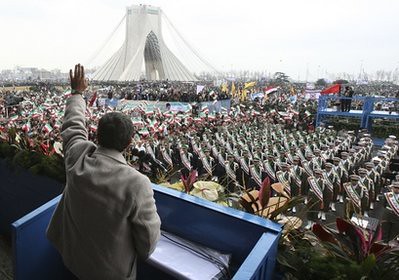
Iranian President Mahmoud Ahmadinejad, waves to the crowd in a rally marking the 32nd anniversary of the 1979 Islamic Revolution, at the Azadi (Freedom)Square, in Tehran, Iran, Friday, Feb. 11, 2011, while the Azadi monument tower is seen in background. , a photo by Pan-African News Wire File Photos on Flickr.
UN body tones down Iran rhetoric
Says diplomacy key to resolving nuclear arms talks
By George Jahn
Associated Press
March 09, 2012
Iran’s Supreme Leader Ayatollah Ali Khamenei praised President Obama’s statement this week that he saw a window of opportunity to use diplomacy to resolve the nuclear dispute.
VIENNA - Three days of protracted negotiations held under the specter of war highlighted the diplomatic difficulties ahead for nations intent on ensuring that Iran is not developing nuclear weapons.
In a statement Thursday that was less than dramatic, six world powers avoided any bitter criticism of Iran and said diplomacy - not war - is the best way forward.
The cautious wording that emerged from a weeklong meeting of the UN nuclear agency reflected more than a decision to tamp down the rhetoric after a steady drumbeat of warnings from Israel that the time was approaching for possible attacks on Iran to disrupt its nuclear program.
Indeed, the language was substantially milder than the tough approach sought by Washington and allies Britain, France, and Germany at the International Atomic Energy Agency’s 35-nation board meeting. Agreement came only after tough negotiations with Russia and China.
That could spell trouble on any diplomatic path ahead.
Russia, China, and the four Western nations have agreed to meet with Iran in another effort to seek a negotiated solution. But with East-West disagreements within the group greater than ever, it could be difficult for the six to act in coordination at those talks.
A previous series of talks between the six and Iran ended in failure, the last one more than a year ago in Istanbul. But the issue of six-power unity was never tested during those talks, because Tehran refused even to consider discussing concessions on its nuclear program.
That could change as Russian and Chinese irritation grows with what the two consider unwarranted tough and unilateral sanctions recently imposed on Iran by Washington and the European Union. Tehran might try to exploit the rift by offering a compromise that Moscow and Beijing would likely welcome but the West would proclaim meaningless.
Thursday’s statement indicated that the West was willing to go some ways to maintain at least a semblance of six-power unity.
It refrained from calling out the Islamic Republic for refusing to cooperate with the IAEA’s probe of allegations that it secretly worked on components of a nuclear arms program.
Instead, it put the onus both on Iran and the IAEA to intensify their dialogue to resolve the four-year standoff. And indirectly countering weeks of Israeli saber-rattling, the statement emphasized “continued support for a diplomatic solution to the Iranian nuclear issue.’’
Returning to Jerusalem from intensive talks in Washington, Prime Minister Benjamin Netanyahu of Israel said his government will not allow Iran to obtain atomic bombs but prefers a peaceful solution to the issue
“I hope that Iran chooses to part from its nuclear program peacefully,’’ Netanyahu said. “It is forbidden to let Iran arm itself with nuclear weapons, and I intend not to allow it.’’
Israel and the United States agree that Iran is on a path that could eventually lead to the production of a nuclear weapon but part ways over urgency: Netanyahu has seemed impatient with President Obama’s statements that tough new economic sanctions imposed by the West be given time to work.
Ali Asghar Soltanieh, Iran’s chief IAEA delegate, condemned Israel’s “continuous threat of attack against Iran’s nuclear facilities.’’
In Tehran, Iran’s top leader welcomed comments by Obama advocating diplomacy as a solution in a rare positive signal from the head of a nation that regards Washington as its bitter foe.
Ayatollah Ali Khamenei, quoted by Iran’s state television, praised Obama’s statement this week that he saw a window of opportunity to use diplomacy to resolve the nuclear dispute.
Khamenei, who has final say on all state matters in Iran, told a group of clerics: “This expression is a good word. This is a wise remark indicating taking distance from illusion.’’
No comments:
Post a Comment